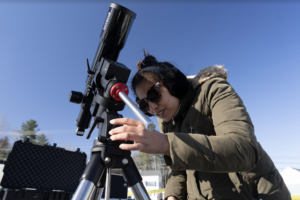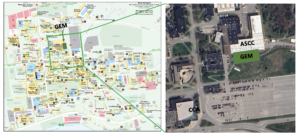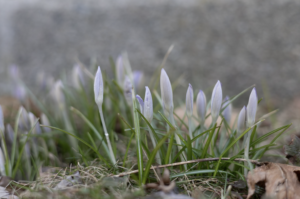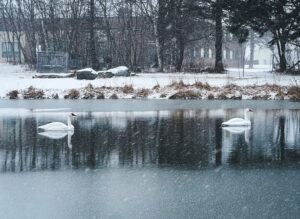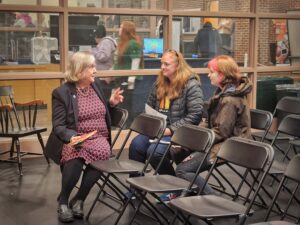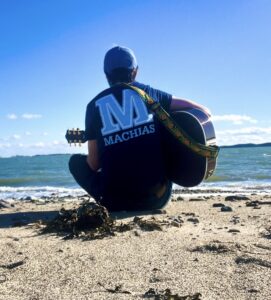As many readers will know, per- and polyfluoroalkyl substances, more commonly known as PFAS, have been a growing environmental concern in Maine. As defined by the U.S. Environmental Protection Agency, these are very long-lasting chemicals that are most commonly found in water, air, fish, and soil that can be linked to harmful health effects in both animals and humans. The extremely decelerating rate at which these chemicals break down is why they have also been named “forever chemicals.”
One small Machias, Maine family business, the Schoppee Farm, has taken the initiative to do what it can to resolve this environmental issue. Eight-generation owner Ben Edwards, who has a background in biochemistry, has been researching how growing hemp can purify soil contaminated with PFAS. While researching this process, the farm grows hemp for the products it sells in organic, high-quality soil on the same property the family has used for centuries.
I had the pleasure of talking to both Ben Edwards and Ciara Schoppee, who are descendants of the founder, about the business that they take pride in, as well as their research. At the time of the interview, the business was celebrating its 200th year since the Schoppee Farm was established.
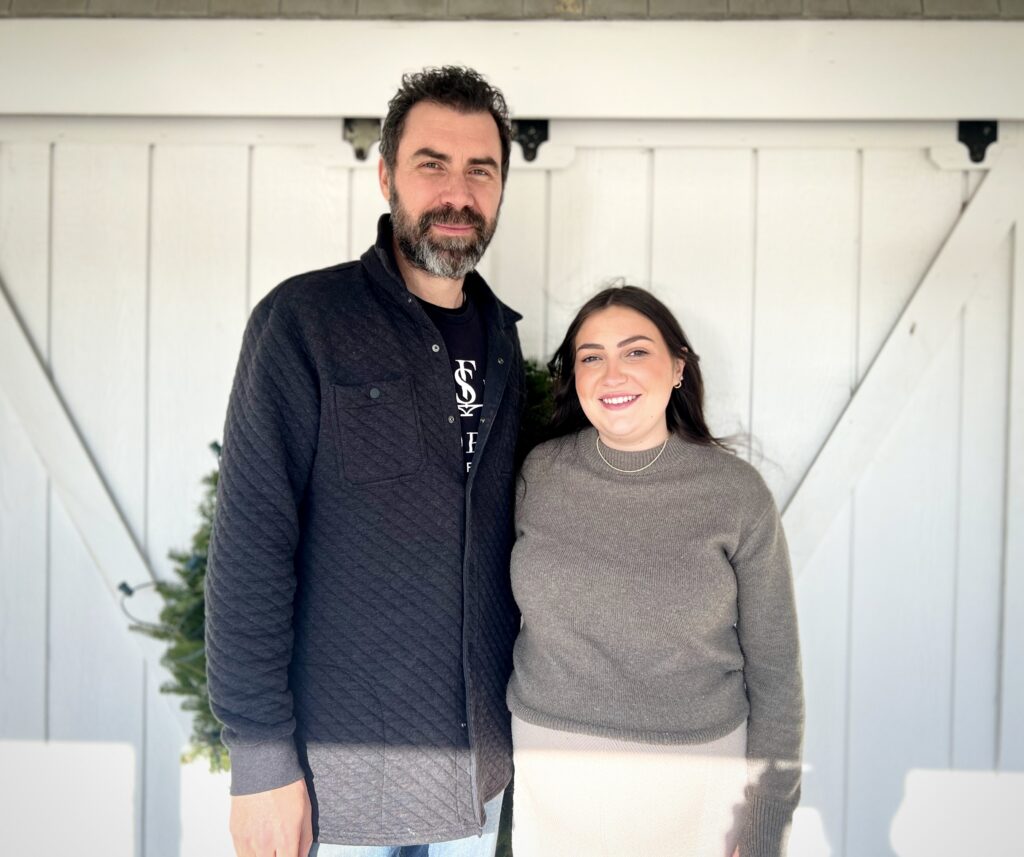
The process of PFAS remediation was described as followed by Edwards. To remediate PFAS from the soil, a variety of different kinds of hemp is grown in the contaminated soil. After the plant has grown, it has taken the harmful chemicals out of the soil. Lastly, the hemp is incinerated in a “high-temperature gasification furnace,” where the small amount of PFAS that is left in the plant is broken down by the extreme temperatures and is turned into is turned into high purity biochar (90%+ carbon). To be perfectly clear, the hemp used for PFAS remediation is not consumed and is used in none of the Schoppee Farm’s products.
Due to the success that Schoppee Farm has seen with their research, they will begin to plant in contaminated areas around the community, starting with the Machias Airport.
Along with the research and hemp, the Schoppee Farm produces, grows, and sells a variety of medicinal products, vegetables, and turmeric while also running a café. In the near future, the farm will also sell flowers, seaweed-grown potatoes, wine, and cider.
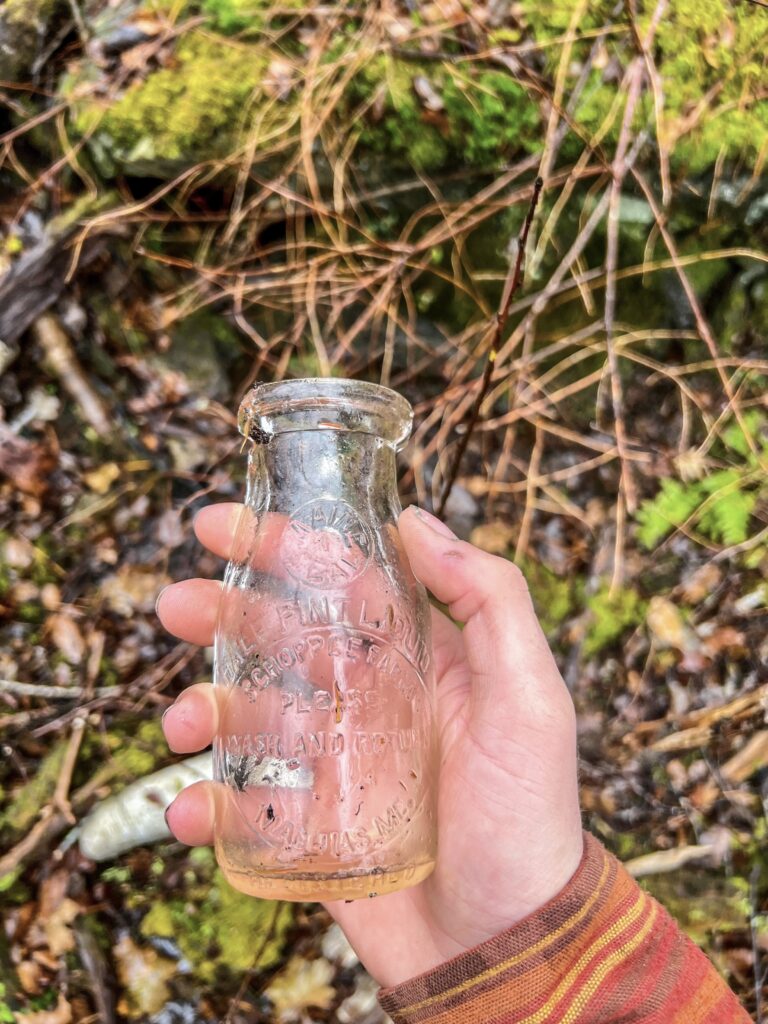
How did we come to find out about this incredible research the Schoppee Farm is spearheading? While roaming the forest behind the University of Maine at Machias (UMM), documenting the remains of long-lost homes and streets, I came across this bottle hidden in a crumbling rock wall. I was intrigued to read “Machias, Maine” and “Schoppee Farm” engraved into the dirty glass. I chuckled as I read “please wash and return” on the face of the milk bottle, thinking, “I wonder if that farm still exists, and wouldn’t it be something to return it 80 (or so) years late?” As I looked up from wiping the grime off the old discarded object, I met the gaze of a deer, silently staring from only a few feet away. As I recorded its movements on my phone, about 3 or 4 others came out from their “hiding places,” where they had been watching me the whole time. Though most likely biased by “Love Like Ghost” by Lord Huron playing through one earbud, my mind immediately went to the reincarnation of those who worked this land decades and centuries ago.

“To get to go out and work the same land and think that my grandfather, great grandfather, all the way back two hundred years, made their living with their hands in the same soil is very powerful. And especially now that I have children,” Edwards expressed in regards to seeing the relic of the farm’s past. “It [the business’s history] drives everything that we do. The way that we want to run the business and what we see for in the future,” Schoppee added.
According to Edwards, the original founding Schoppee was a Hessian mercenary who came to North America to fight in the Revolutionary War, and after being captured and converted to fight for the colonies, he settled in Machias. In 1823, the farm was established and then later became a commercial dairy, which eventually moved into town. This dairy that was on what is now Rt.1 in Machias is where the bottle I found came from.
In the early 1960s, the Schoppee Farm closed down, and it wasn’t until 2019 that Edwards reopened the business.

When Edwards reestablished the business at first, as a commercial dairy, and then a conventional produce farm, not only was a global pandemic underway, but all four of the first contract buyers went bankrupt. One company even took half a crop without ever paying. After realizing the farm was idealy situated to grow hemp, the business began to grow the plant.
Through our interview, it became apparent that both Edwards and Schoppee care deeply about their community and ensuring that the Schoppee Farm has a positive impact.
“I wanted to do something that was primary, that used our local resources in a way that would bring outside money into the community… Because I’m concerned about the state of our fisheries… Our blueberry industry, we have essentially no control over, and that has largely shifted to Canada. Our forestry industry is a similar thing. Our primary revenue-generating industries, other than tourism… are threatened. So I wanted to make sure that we create a primary industry… to create good career jobs,” Edwards explained.
At the end of our interview, Schoppee stated, “Ultimately, we always hoped that we’ll grow and create good jobs for people… A place [Machias] where people can stay…” Schoppee went on to state how important it is to her that more members of the younger generation feel they can stay in Machias.
If you would like more information on the Schoppee Farm and the products they offer, visit their website at https://shopschoppee.com/pages/schoppee-farm-farm.

